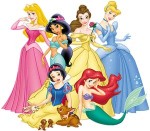 Even though we’re just now doing an official Disney Theme Week, we’ve covered this particular genre-cum-studio ever since the first year of the site, 2008. As they say, “the literature on the topic is extensive.”
Even though we’re just now doing an official Disney Theme Week, we’ve covered this particular genre-cum-studio ever since the first year of the site, 2008. As they say, “the literature on the topic is extensive.”
Gender Studies & Political Science
Not surprisingly, the site that brought you “Why Strong Female Characters Are Bad For Women” and “The Female Character Flowchart” has given considerable coverage to the idea of the “Disney Princess.” Stokes gives us a celebration and analysis of the movie Enchanted. Mlawski took on the racial controversy leading up to the most recent entry into the Princess-hood, The Prince and the Frog, which Belinkie later analyzed and declared that it’s “having its gumbo and eating it too.” Oh, and there’s a spectacular chart that accompanies it:
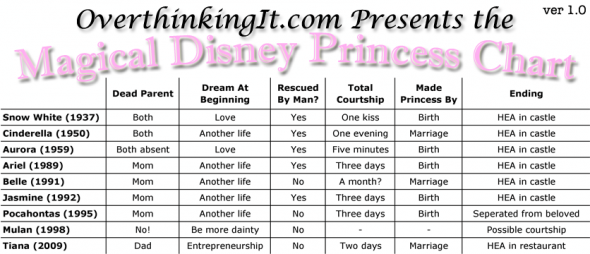 Which is great, but how exactly do you define “princess”? Belinke has that covered too, in his piece, “Belle: Princess or Not Princess?” (Spoiler alert: probably, yes.)
Which is great, but how exactly do you define “princess”? Belinke has that covered too, in his piece, “Belle: Princess or Not Princess?” (Spoiler alert: probably, yes.)
Religious Studies
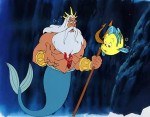 Guest writer Caroline Loy gives a convincing argument on how The Little Mermaid is both a retelling of the story of The Fall as well as a “sophisticated criticism of some of the basic tenets of Judeo-Christian beliefs.” Here’s a taste:
Guest writer Caroline Loy gives a convincing argument on how The Little Mermaid is both a retelling of the story of The Fall as well as a “sophisticated criticism of some of the basic tenets of Judeo-Christian beliefs.” Here’s a taste:
God could not save Eve [Ariel] from Satan. But Prince Eric could, because Disney believes that people don’t need God to protect them from the influences of evil. What they need to bring to the fight is knowledge. Eve defied God and had a dangerously close brush with evil, but she survived because she was helped by the very knowledge God had forbidden.
Ethics
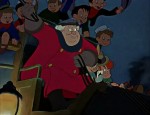 Have you ever considered that the Coachman from Pinocchio may actually be doing kids a favor when he turns them into beasts of burden? Guest Writer Melanie Englert argues this point in her piece, “To Coachman With Love: Pinocchio and Behavioral Therapy.”
Have you ever considered that the Coachman from Pinocchio may actually be doing kids a favor when he turns them into beasts of burden? Guest Writer Melanie Englert argues this point in her piece, “To Coachman With Love: Pinocchio and Behavioral Therapy.”
A detailed glimpse into Pleasure Island Inc. could reveal a noble cause. Though the film’s setting is unknown, the original story places the characters within the Tuscany region of Italy: the same region that produced the likes of Andrea Pisano, Filippo Lippi and of course, Michelangelo. Obviously things have taken a turn for the worse by the end of the 19th century. The local boys have run amok and no longer offer any contribution to the world at large; fist-fights, substance abuse, generalized anti-social behavior rule the day.
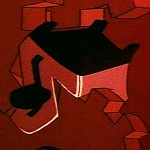 Or have you considered that Disney, in its pre-Pixar days, may have severely traumatized young children with The Brave Little Toaster? Belinkie sure thinks so:
Or have you considered that Disney, in its pre-Pixar days, may have severely traumatized young children with The Brave Little Toaster? Belinkie sure thinks so:
This is a children’s movie about an adorable talking toaster. And at the end of the film, he jumps face-first into industrial machinery. We watch him get ripped apart. The fact that anyone thought this was appropriate for children amazes me.
The Creative Process
This one is of a category all its own. A lot of you may have missed this gem by Fenzel from the early days of the site, “A Sneak Peak Inside the Dream Factory.” It defies description. All I can say is that you may never think of a certain animated Disney TV show in the same way again after reading this. So as not to give away too much, I’ll just post this cryptic image from the article and compel you to click through to read:
Since comments are closed on the old posts, leave your reactions here.
And lest we deprive you of all your childhood innocence, let’s end on a happier note, shall we?
http://www.youtube.com/watch?v=GUhL947dLuA
Happy Disney Week, Overthinkerteers!

Thoughts on TPatF: Comparative Analysis
They did have big mainstream movie acting names but they did have Broadway names. Lea Salonga (Mulan and Jasmine singing), Judy Kuhn (Pocahontas singing), and Anika Noni Rose is the other Dreamgirl in Dreamgirls. Aladdin is the guy from Full House and the Beast is Robby Benson and though I wasn’t born, I’ve heard that people like Ice Castles. OK, maybe I’m not really making a point.
Is Lawrence the only example of the English-accented majordomo as villainous comic relief? I would argue that the villainous butler in The Aristocats came first.
Does having a wake of sorts for Snow White count as a funeral if she isn’t actually dead? Does anyone remember if they have a funeral for Kocoum in Pocahontas? General Li, Shang’s father does die in Mulan. I think. But offscreen and I don’t think he gets a funeral other than the symbolic gesture with the sword and the helmet.
I really enjoyed The Princess and the Frog when I saw it even if I wasn’t crazy about the songs.
Correction to a closed comment board regarding Mulan’s mother. Her mother is dead. The woman getting her ready is the matchmaker, not her mother.
Sorry, but I fact-check my articles carefully. Mulan’s mom is alive and well:
http://movies.yahoo.com/movie/1800023559/photo/548764
Her name is Fa Li:
http://en.wikipedia.org/wiki/List_of_Mulan_characters#Mulan.27s_family
Are you saying all Asian cartoon characters look the same? :) Her mom is in the movie quite a few times.
RE: The Brave Little Toaster, all ‘dark’ 80’s animated movies for children.
I miss children’s movies with Life or Death high stakes. These movies felt real, they never pandered, they never assumed children couldn’t handle horrific themes.
That being said, without a doubt the award scariest scene to kid me goes to the “No Cats in America” sequence in An American Tail. Holy SHIT did that mess me up as a child. I had problems watching that part of the movie for a good 10 years.
But Brave Little Toaster is a great goddamn movie– Toy Story 3 was hailed as being so adventurous for its storyline, but it is entirely cribbed from Brave Little Toaster!
And I have “Worthless” on my iPod (the song the junk cars sing as they are being crushed) and I don’t care who knows it.
Not gonna lie I was hoping someone would do something about Tangled. I really enjoyed that movie and I think it needs to ruthlessly (yet lovingly) picked apart.
I liked this one about Tangled and How to Train Your Dragon from a while back:
http://www.overthinkingit.com/2011/04/18/tangled-how-to-train-dragon-science/
This is not overthinking, it borders on saying the obvious, it takes an idiot to not see the Brave Little Toaster has some rather dark moments. There is way too much time wasted on how the movie asks the viewer to suspend disbelief to repair a toaster. BFD! That says nothing of overthinkng. Now taking those dark moments and discussing how such part plot points with anthropomorphic appliances would effect children and how they treat other people. Even arguing the Brave Little Toaster is a movie about conservation or anti-consumerism sound like much better overthinking subjects than “herp derp, The Brave Little Toaster is dark.”
I’ll allow myself a tiny bit of self-praise and say I still love my “dream factory” advice – “Just figure out what doesn’t work and do something other than that.”
The intervening years have done little to dampen my enthusiasm for this outlook on problem-solving.
At this point, isn’t criticizing Disney movies for being sexist, lookist, racist, classist, ableist, etc. like shooting fish in a barrel while preaching to the choir (to mix metaphors)? People who read these essays either have read all these critiques before, or they just shrug and say, “The songs are nice and the kids are quiet while they watch it so I can have a break.”